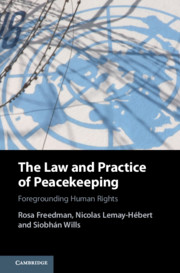Book contents
- The Law and Practice of Peacekeeping
- The Law and Practice of Peacekeeping
- Copyright page
- Contents
- 1 Introduction
- 2 A Political History of UN Involvement in Haiti
- 3 Integrating Human Rights Norms into UN Peacekeeping Practice
- 4 UN Immunities and Human Rights
- 5 The Cholera Epidemic
- 6 Sexual Exploitation and Abuse
- 7 UN Peacekeepers’ Use of Deadly Force to Maintain Law and Order
- 8 Conclusion
- Index
4 - UN Immunities and Human Rights
Published online by Cambridge University Press: 28 May 2021
- The Law and Practice of Peacekeeping
- The Law and Practice of Peacekeeping
- Copyright page
- Contents
- 1 Introduction
- 2 A Political History of UN Involvement in Haiti
- 3 Integrating Human Rights Norms into UN Peacekeeping Practice
- 4 UN Immunities and Human Rights
- 5 The Cholera Epidemic
- 6 Sexual Exploitation and Abuse
- 7 UN Peacekeepers’ Use of Deadly Force to Maintain Law and Order
- 8 Conclusion
- Index
Summary
In order to discuss the legacy of MINUSTAH and the lack of accountability for civil and criminal wrongs, it is first necessary to understand the current system of immunities and of the UN and of its personnel. The system of immunities for the UN and its personnel was created in 1946, and as the Organisation has grown and its activities have developed, there have been increasing criticisms of and challenges to the application of those laws, particularly from a human rights perspective. In 1946 the system reflected understandings of state and diplomatic immunity, and those laws were enshrined in a Convention that has remained unchanged for more than seven decades despite state and diplomatic immunity evolving since that time. As such, the system is criticised for being unfit for purpose, particularly where it prevents individuals from being able to realise their fundamental rights to access a court and a remedy. In Haiti there have been many examples of when UN immunities have prevented justice for victims, including use of force and criminal wrongs perpetrated by peacekeepers.
- Type
- Chapter
- Information
- The Law and Practice of PeacekeepingForegrounding Human Rights, pp. 48 - 65Publisher: Cambridge University PressPrint publication year: 2021

